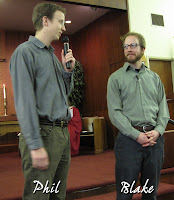 NINE YEARS AGO, my youngest son Blake was to preach at his big brother Phil's church, and I got a phone call from Evelyn, Phil's three-year-old. Was I coming down to her house?
NINE YEARS AGO, my youngest son Blake was to preach at his big brother Phil's church, and I got a phone call from Evelyn, Phil's three-year-old. Was I coming down to her house?"Yes, do you want to play?" I asked.
"Yes, and we can sit next to each other. And hold hands."
You gotta love little girls. They're so relational.
And so I went down and spent the weekend with Phil and his family, held hands with Evelyn, and heard Blake preach.
His sermon was on forgiveness, something Blake and I go around and around on all the time. Here's why: No one has a very good definition.
I grew up with this one: Forgive and forget. Mmmmm. Charlie Brown "forgives and forgets" when Lucy sets a foot ball in front of him. How well does that work?
Or this: Let it go. Go where? What does that look like? How does one do this? Seriously, what are you talking about? Step by step, how is this done?
How about "Get over it already." A kind of "it's your fault you can't get over my adultery... my sexual assault... my bad tempter... my putting you down... my..." This is nothing more than blame the victim for inflicted damage.
Or this: You haven't forgiven unless you forgive seven times seventy. Fantastic. Somewhere between one and 490 beatings you wind up dead.
Here's another favorite. Just move on. Another esoteric bit of mumbo jumbo that's hard to get your head around. Like cotton candy as soon as you bite. Poof! Gone! What do those words mean. And try telling them to survivors of abuse so severe it's damaged their souls and minds.
The one definition that Blake and I both agree upon is Anne Lamott's. She posits that forgiveness is the letting go of the wish for a different past. Okay then! Here we go! No airy-fairy words, where meaning vanishes the longer they're pondered. This gives one something to do.
So let's talk about a different past. I was seventeen and out of the house when I was badly molested by a Christian doctor. Not something one just "gets over." It catapulted me down a path of sexual fear, resistance and cynicism of Christian men, and a sense of God's helplessness to intervene and protect me. I certainly do wish this had never happened. But it did, right smack dab in the middle of a whole lot of really good things. So if given the option of erasing the bad, I have to consider: What happens to the good that was knit into it and around it? How does one extrapolate an event from the surrounding many? You can't. You take the good and suddenly you don't yearn so much for a different past. You want all those good things! Here's the beauty. The victimizer becomes inconsequential. Forgiveness doesn't really have anything to do with it anymore.
 I so much as shared this with Blake afterward. "Great, but what about Dad?" he asked.
I so much as shared this with Blake afterward. "Great, but what about Dad?" he asked.Well, that's a big one. On that score I certainly wish I had a different past. Oh my goodness, who and what could I have been if I hadn't suffered ten long years of denigration, neglect, emotional abuse, and stripped of any reason to exist but to please him?
My preacher-boy looked me in the eye and said, "Well, whenever you wish you'd never married Dad, just take a look at Evelyn."
Ahh! See how this works?
Forget forgiveness. Forget whatever the heck it is, or isn't. Instead focus on the life and love that is miraculously growing out of all that darkness.
